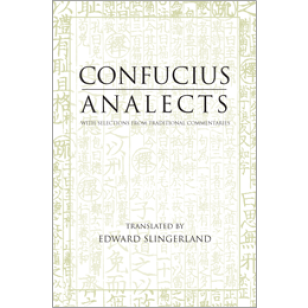Analects
"Confucius taught that 'virtue is never solitary; it always has neighbors.' (4.25). Based on the best modern and traditional Chinese and Western scholarship, Edward Slingerland's exemplary new translation of the Analects—including selections from the traditional commentaries on each passage of the text—is a welcome edition. Contemporary readers will be enlightened as to what Confucius taught his disciples and will share the experience of being a neighbor to all the generations of students who have pondered the sometimes cryptic and enigmatic words of Confucius. Slingerland's use of commentary gives readers a fighting chance at understanding and appreciating this foundational Confucian classic." —John Berthrong, Boston University
eBook available for $14.95. Click HERE for more information.
To view supplemental material to this text on the Analects title support page, click HERE.
This edition goes beyond others that largely leave readers to their own devices in understanding this cryptic work, by providing an entrée into the text that parallels the traditional Chinese way of approaching it: alongside Slingerland's exquisite rendering of the work are his translations of a selection of classic Chinese commentaries that shed light on difficult passages, provide historical and cultural context, and invite the reader to ponder a range of interpretations. The ideal student edition, this volume also includes a general introduction, notes, multiple appendices—including a glossary of technical terms, references to modern Western scholarship that point the way for further study, and an annotated bibliography.
Edward Slingerland's TED Talk: Trying Not to Try: the Power of Spontaneity
Reviews:
"Confucius taught that 'virtue is never solitary; it always has neighbors.' (4.25). Based on the best modern and traditional Chinese and Western scholarship, Edward Slingerland's exemplary new translation of the Analects—including selections from the traditional commentaries on each passage of the text—is a welcome edition. Contemporary readers will be enlightened as to what Confucius taught his disciples and will share the experience of being a neighbor to all the generations of students who have pondered the sometimes cryptic and enigmatic words of Confucius. Slingerland's use of commentary gives readers a fighting chance at understanding and appreciating this foundational Confucian classic."
—John Berthrong, Boston University
"This work not only exemplifies meticulous research and scrupulous craft of translation, it also offers a new perspective for Analects scholarship and a new model for Analects translation. Edward Slingerland should be congratulated for providing such an invaluable service to American college students as well as the scholarly community at large. There is much for us to learn from this new translation, and we are all indebted to its author." —Yuet Keung Lo, China Review International
"Edward Slingerland's new translation of the Confucian Analects is something that we have long needed: an accurate, lucid rendition paired with helpful explanations and reference material, including selections from the most important traditional commentaries. General readers and students will find no more accessible, reliable entree to this difficult and seminal text. This new Analects is an extraordinary contribution and should by rights become the preferred starting-point for English-language readers."
—David Schaberg, University of California, Los Angeles
"[I]t is a pleasure to have, hold, and handle Slingerland's Analects with its more than 300 pages of scholarship in crisp and very readable English fine print and crystal-clear Chinese characters to match—all at a price our students are able to afford. . . . With this new translation comes a wealth of supplementary material. The Preface and Introduction, simply written but brimming with information, are followed by a Traditional Chronology of events in the history of Confucianism. After the translation, with commentaries generously included throughout, come five appendices: (1) Glossary of Terms, (2) brief introductions to Disciples of Confucius, (3) some other Historical Personages referred to, (4) notes on Traditional Chinese Commentators cited, and (5) remarks on other relevant Traditional Chinese Texts. Quite a smorgasbord; but I suspect it will be the abundant, almost too abundant, citations from those commentators following each of the chapters . . . which will convince many that this is an item they simply have to own."
—David Fielding, Dao: A Journal of Comparative Philosophy
"Though there are many English versions of the Analects available, including half a dozen new efforts published in the past decade, none until now has been truly satisfactory. Whether the translation has been unreliable, the commentary misguided or inadequate, or the presentation self-consciously eccentric, all have been wanting in one way or another. Slingerland's book finally gives us what we have been waiting for. Not only do we have here a trustworthy English rendering of the text but, in addition, aptly chosen selections from traditional commentaries following each analect. Thus, students will now have access to a version of the book that reflects, in a most inviting manner, both the suggestive depth of the text and the influence it has had on centuries of Chinese readers. This should now be the Analects version of choice for use in undergraduate classes."
—Paul W. Kroll, Department of East Asian Languages and Civilizations, University of Colorado
"This is now one of the best translations of the Analects for students. The translator's philosophical training is evident throughout, yet he does not impose Western ideas and modes of discourse where they are unwarranted. Another useful—and unique—feature of this translation is the inclusion of a generous and accurate selection of traditional commentary for each passage of the canon."
—Paul R. Goldin, University of Pennsylvania
About the Author:
Edward Slingerland is Associate Professor of Asian Studies, Canada Research Chair, University of British Columbia.











